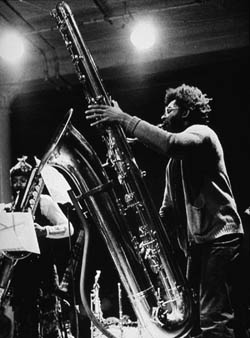Dualistic Banjos and Other Highs
HIGH TIMES IN POUTINE LAND: In Victoriaville, Quebec, a modest-sized town of deep in the province’s French-speaking zone, the avant-garde-musicians and true believers-descends in droves for five days each spring. Now in its 24th year, the festival officially known as FIMAV (Festival International de Musique Actuelle de Victoriaville) – Victo for short – has become a rallying place for those seeking a concentrated dose of stuff left of even the left of the dial.
Here in the bucolic land of poutine – a caloric and delicious Quebecois dish involving cheese curd, french fries, gravy and gastronomic whatnot – the soundscape goes briefly, seductively wild. Two weekends back, the fare included new jazz (i.e. the amazing Cor Fuhler-led Dutch group, Corkestra, this festival’s surprise hit), free improvisation, anti-rhythmic electronic music with laptops, “noise-icians” (Keiji Haino/Merzbow), new musique concrete (Theresa Transistor), fancypants neo-prog rock from Japan and Vancouver (Koenji Hyakkei and Fond of Tigers, respectively), and seasoned rock misfits ( Melvins, Acid Mother Gong).
New, surprising ideas still sneak into the mix. Take, par example, the (mostly) banjo duo of Eugene Chadbourne and Kevin Blechdom: closing a set which swerved deliriously from tipsy Americana to Syd Barrett-era Pink Floyd covers, the pair goofballed “Dueling Banjos.” Kevin (actually a woman) humped her banjo, and the pair enacted an onstage, starter pistol gunfight. Voila, a double whammy FIMAV first, with gunplay and sex with instruments! (That’s not exactly true, if one loosely interprets the vaguely erotic electric guitar contortions of the Magik Markers’ ritualistic singer-guitar abuser Elisa Ambrogio). In another FIMAV oddity, Germany’s Larry Peacock, the dryly satirical feminist all-female group (in male disguises) sang an ode to a marital device, and lured the crowd into a singalong.
Anomalies from this grand anomaly party aside, this festival’s biggest names had major jazz cred, specifically involving iconoclastic veterans-in-training. Most importantly, the mighty, brainy and just plain good Anthony Braxton returned to FIMAV after three performances here two years ago. This year, he brought two varied projects: the compact but big-minded Diamond Curtain Wall Trio, and the strangely loose and conversational 12 (+1) Tet, an ensemble marvel, concurrently structured and liberated.

Be-sweatered as usual, Braxton was a commanding presence, playing with both incision and measured abandon. But he’s also a generous musician, eager for interplay. In trio format, he worked a menagerie of instruments, from the wee sopranino to the humungous contra-bass sax–as tall as the player. He also teased sonics out of his latest instrument, a laptop. In the 12(+1)Tet set, the group cooked up a collective temporal stew, with melodies played by duos and subgroups within the whole, adding up to a Utopian musical microcosm.
Braxton is in a thrilling new phase, surrounding his recent 60 birthday. A stint with his 12(+1)Tet in NYC’s midtown basement hangout, the Iridium, resulted in a newly-released a nine-disc box set. Not stopping him now.
Freshly garlanded with his MacArthur “Genius” Grant, John Zorn is a one-man musical world whose influence just won’t quit on the avant-garde scene. He has played this festival many times, in projects large and small. This year, Zorn traveled light, with only his alto sax and a bowl of water (for waterphonic effects), and bravely took up the gauntlet for the challenging solo format, which he favored in his pre-celebrity days. Zorn had no trouble capturing vitality and micromanagerial interest for an unscripted hour.
Another diehard jazz lefty, pianist Marilyn Crispell (formerly in Braxton’s groups), unveiled a new quartet, with nimble Danish saxist Lotte Anker, bassist Mark Helias (another Braxton alum) and the ever-subtle drummer Andrew Cyrille. This group may be a model of what contemporary jazz should be. When not navigating cryptic melodies and song structures, they play free, even beyond typical post-free jazz cliches and limitations. Yes, it was a good year in Victo. The avant-garde hasn’t died: it thrives underground, and in the land of poutine.
(got e? fringebeat@independent.com)



